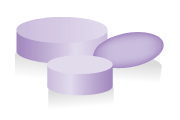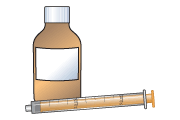Aciclovir (oral) for viral infections
This leaflet is for parents and carers about how to use this medicine in children. Our information may differ from that provided by the manufacturers, because their information usually relates to adults. Read this leaflet carefully. Keep it somewhere safe so that you can read it again.
Name of medicine
Aciclovir
Brand names: Zovirax
Why is it important for my child to take Aciclovir?
The information on this page is about the use of Aciclovir - taken by mouth (orally) - for the treatment of infections caused by the varicella zoster virus (chicken pox/shingles) or herpes simplex virus. Aciclovir slows the growth and spread of the virus so that your child’s body can fight off the infection. Aciclovir is known as an anti-viral medicine.
What is Aciclovir available as?
- Tablets: 200 mg, 400 mg, 800 mg
- Dispersible tablets: 200 mg, 400mg, 800mg
- Liquid medicine (suspension): 200 mg in 5 mL or 400 mg in 5 mL sugar-free (Zovirax contains sorbitol)
When should I give Aciclovir
Aciclovir works best when it is given four or five times over 24 hours.
- For four times a day: Ideally this is every 6 hours through the day and night, but if you do not want to wake a sleeping child, aciclovir can be given first thing in the morning, at about midday, late in the afternoon and at bedtime. Ideally these times should be at least 4 hours apart (e.g. 8 am, 12 noon, 4 pm and 8 pm).
- For five times a day: Ideally, this is every 5 hours through the day and night, but you can give it during the waking day, (e.g. 6 am, 10 am, 2 pm, 6 pm and 10 pm).
Give the medicine at about the same times each day so that this becomes part of your child’s daily routine, which will help you to remember.
How much should I give?
Your doctor will work out the amount of Aciclovir (the dose) that is right for your child. The dose will be shown on the medicine label.
It is important that you follow your doctor’s instructions about how much to give.
How should I give Aciclovir?

Tablets
- Tablets should be swallowed with a glass of water, squash or juice. Your child should not chew the tablet.

Dispersible tablets
- Dispersible tablets should be stirred into a glass of water, which will make a cloudy mixture. Your child should then drink it all straight away, or they can sip it over half an hour or so (stir before each sip). You can add squash to the mixture to hide the taste.

Liquid medicine
- Shake the medicine well.
- Measure out the right amount using an oral syringe or a medicine spoon. You can get these from your pharmacist. Do not use a kitchen teaspoon as it will not give the right amount.
When should the medicine start working?
Your child should start to feel better after taking the medicine for a few days. It is important that they take the whole course of the medicine that has been prescribed (usually 5 days).
Do not stop early, as the viruses may start to multiply again and the infection may return. Your doctor may recommend another 5 day course of Aciclovir.
What if my child is sick (vomits)?
- If your child is sick less than 30 minutes after having a dose of Aciclovir, give them the same dose again.
- If your child is sick more than 30 minutes after having a dose of Aciclovir, do not give them another dose. Wait until the next normal dose.
If your child is sick again, seek advice from your family doctor, nurse, pharmacist, or hospital. They will decide what to do based on your child’s condition and the specific medicine involved.
What if I forget to give it?
If you miss a dose, wait until the next normal dose. Do not give the missed dose.
If you have missed more than one dose, contact your doctor or pharmacist for advice.
Never give a double dose of Aciclovir.
What if I give too much?
If you think you may have given your child too much Aciclovir, contact your doctor or local NHS services (details at end of leaflet) or take your child to hospital. Have the medicine container or packaging with you, even if it is empty. This will be useful to the doctor.
It may be dangerous to give too much Aciclovir.
Are there any possible side effects?
We use medicines to make our children better, but sometimes they have other effects that we don’t want (side effects).
Side effects you must do something about
If your child is short of breath or is wheezing, or their face, lips or tongue start to swell, or they develop a rash, they may be allergic to Aciclovir. Take your child to hospital or phone for an ambulance straight away.
Other side-effects you need to know about
Your child may get some of the following side-effects when they first start taking aciclovir. These should wear off after a few days and will stop when your child stops taking the medicine. If you are worried, contact your doctor but continue to give aciclovir.
- Your child may feel sick or be sick (vomit) and may get diarrhoea. Giving the medicine with some food or milk may help.
- Your child may develop itchiness or a rash. Using a moisturising cream may help.
Your child may have a headache or feel dizzy, tired (lethargic) or sleepy (drowsy).
Your child’s skin may become more sensitive to sunlight. Keep them out of strong sun. When outdoors, they should wear a long-sleeved top, trousers and a hat and should use a high-factor sun cream (at least SPF 30).
There may sometimes be other side effects that are not listed above. If you notice anything unusual and are concerned, contact your doctor. You can report any suspected side effects to a UK safety scheme at mhra.gov.uk/yellowcard
Can other medicines be given at the same time as Aciclovir?
- You can give your child medicines that contain paracetamol, unless your doctor has told you not to.
- Aciclovir should not be taken with some medicines. Tell your doctor or pharmacist about any other medicines your child is taking before giving Aciclovir.
Check with your doctor or pharmacist before giving any other medicines to your child. This includes herbal and complementary medicines.
Is there anything else I need to know about this medicine?
- It is important that your child takes the whole course of this medicine, which is usually for 5 days but may be much longer. Your doctor will tell you how long it needs to be taken for. If you stop early, the infection may come back, and may then be harder to treat.
- Children are sometimes sick (vomit) or get diarrhoea when taking antiviral medicines. Encourage them to drink water to replace the fluid they have lost, and consult your doctor if they are not drinking or are unwell.
- Do not give your child any medicine to stop the diarrhoea unless your doctor has told you to, as this can make things worse.
- Aciclovir can only be used to treat infections caused by the varicella zoster virus and the herpes simplex virus. It cannot be used to treat infections caused by other viruses.
General advice about medicines
- Only give this medicine to your child. Never give it to anyone else, even if their condition appears to be the same, as this could do harm.
- Give any unused medicine to your pharmacist to dispose of. Do not keep it for treating future infections.
- If you are not sure a medicine is working, contact your doctor but continue to give the medicine as usual in the meantime. Do not give extra doses, as you may do harm.
If you think someone else may have taken the medicine by accident, contact your doctor straight away.
Where should I keep this medicine?
- Keep the medicine in a cupboard, away from heat and direct sunlight.
- It does not need to be kept in the fridge.
- Make sure that children cannot see or reach the medicine.
- Keep the medicine in the container it came in.
Who to contact for more information?
Your child’s doctor, pharmacist or nurse will be able to give you more information about Aciclovir and about other medicines used to treat viral infections.
England: NHS 111
Tel 111
www.nhs.ukScotland: NHS 24
Tel 111
www.nhs24.scotNorthern Ireland: NI Direct
Wales: NHS 111 Wales
Tel 111
www.111.wales.nhs.ukCopyright disclaimer
Version [2]. © NPPG, RCPCH and WellChild, all rights reserved. Review by May 2022.
The primary source for the information in this leaflet is the British National Formulary for Children. For details on any other sources used for this leaflet, please contact us through our website, www.medicinesforchildren.org.uk.
We take great care to make sure that the information in this leaflet is correct and up-to-date. However, medicines can be used in different ways for different patients. It is important that you ask the advice of your doctor or pharmacist if you are not sure about something. This leaflet is about the use of these medicines in the UK, and may not apply to other countries. The Royal College of Paediatrics and Child Health (RCPCH), the Neonatal and Paediatric Pharmacists Group (NPPG), WellChild and the contributors and editors cannot be held responsible for the accuracy of information, omissions of information, or any actions that may be taken as a consequence of reading this leaflet.
